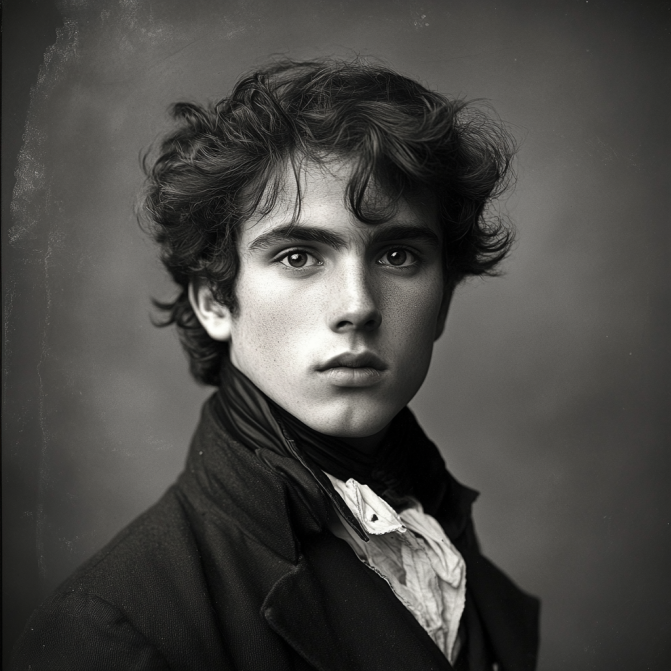George Gordon Byron (Lord BYE-ruhn)
Poet
George Gordon Byron (a.k.a. Lord Byron)
George Gordon Byron, better known as Lord Byron, was born on January 22, 1788, in London, England. He was born into a noble but troubled family, inheriting the title of "Baron Byron" at a young age. Byron grew up in Scotland before attending Harrow School and later Trinity College, Cambridge. Early in life, Byron gained a reputation for his wit, charm, and unconventional behavior. He published his first collection of poetry, Hours of Idleness, in 1807, but it was his 1812 work, Childe Harold's Pilgrimage, that made him an instant literary sensation.
Byron became known as one of the leading figures of the Romantic movement, characterized by his passionate and often rebellious personality. He was famously described as "mad, bad, and dangerous to know," a label that would follow him throughout his life. Byron’s personal life was as scandalous as his poetry—he had numerous love affairs, including rumored incestuous relations with his half-sister, Augusta Leigh, and a string of liaisons that shocked society. His reputation eventually forced him to leave England in 1816, never to return.
After his self-imposed exile, Byron spent time in Switzerland, Italy, and Greece, writing some of his most famous works, including Don Juan, an epic poem that pokes fun at human nature and society. His works, filled with brooding heroes, biting satire, and revolutionary ideals, cemented his place as one of the most important poets of his era. Byron’s letters and journals also reveal his deep compassion for social justice, and his fascination with the Greek War of Independence led him to travel to Greece in 1823 to aid in their fight against the Ottoman Empire.
In Greece, Byron became a national hero, not only for his financial support but also for his dedication to the cause. Despite his ill health, Byron was preparing to lead troops when he developed a fever in Missolonghi. He died on April 19, 1824, likely from a combination of fever and poor medical treatment (including bloodletting). Byron’s death was widely mourned in Greece, where he remains a celebrated figure, but his literary and personal legacy also left a lasting mark on European culture.
Lord Byron's works continue to influence literature and popular culture today, and his life remains a fascinating study of genius, excess, and a constant striving for freedom—both personal and political.
Photo Album
Photo Album
Mental characteristics
Sexuality
Lord Byron was famously involved with both men and women, and his letters and poetry reveal romantic and sexual relationships across genders. His life and work exemplify a fluid approach to love and desire, especially within the Romantic movement.
Social
Hobbies & Pets
When Lord Byron arrived at Trinity College in 1805, he was already well on his way to becoming the walking contradiction history remembers—aristocrat and outcast, genius and scandal, poet and provocation. So naturally, when informed that dogs were strictly forbidden on campus, Byron responded not with compliance, but with theatrical rebellion. He acquired a bear. A living, growling, shaggy bear. Since the college rules didn’t explicitly forbid bears (an oversight they’d soon regret), Byron took great pleasure in parading his new companion across the university grounds—on a chain, no less—while daring anyone to question him. The bear slept in his rooms, reportedly shared in his moods, and served as a very hairy middle finger to institutional authority.
As for the bear’s name? History never caught it—or Byron, in his mischief, may never have bothered to give it one. Some suspect he called it “Bruin,” a literary nod to Reynard the Fox, but Byron’s real joy was likely in its symbolic weight rather than its companionship. He even mused about securing it a fellowship at Trinity, perhaps as a jab at the idea that the bear might have had more academic merit than some of his peers. Whether myth or truth embellished by time, the tale of Byron and his bear endures as the perfect allegory for the man himself: defiant, absurd, and utterly unforgettable.

Species
Realm
Date of Birth
January 22, 1788 CE
Date of Death
April 19, 1824 CE
Life
1788 CE
1824 CE
36 years old
Circumstances of Death
Byron died of a fever while preparing to fight in the Greek War of Independence. His weakened health and poor medical treatment at the time likely contributed to his death. Some speculate it was malaria or sepsis caused by unsanitary bloodletting.
Birthplace
London, England
Place of Death
Missolonghi, Greece
Children
Sex
Male
Sexuality
Bisexual





















